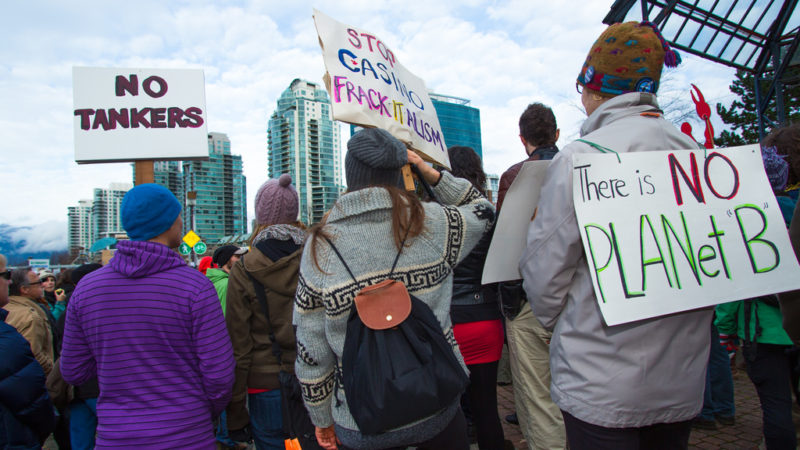We need to start getting serious about a genuinely 'just' climate transition, writes former Green Party leader Natalie Bennett.

‘Enhanced ambition’ is a phrase you hear almost every minute at the annual climate talks in Katowice, Poland. It’s almost always referring to the need for countries and sectors to massively up their plans to slash greenhouse gas emissions – desperately needed when national offers to cut carbon are some five times less than what is needed.
But it became clear on Monday that we need to use the phrase more widely – in thinking about what we want for our societies in this fragile planet. We need “enhanced ambitions” for human life: for the possibilities of how we can not just survive but thrive. “Survive, thrive, 1.5” is the rather neat slogan being promoted by Friends of the Earth.
Given the poor quality of life we’ve created while trashing the planet, simply recreating that in a ‘sustainable’ form is insufficiently ambitious – and is not going to appeal to the people who have to live through the most drastic changes.
Green solidarity
At the UN’s COP climate conference on Wednesday, Lucile Dufour from the Climate Action Network made that point well when referring to the “gilet jaunes” protests in France, led by those angry at fuel tax rises. “The French government should learn from its mistakes,” she said, making provisions to ensure that those who can not afford them are adequately compensated.
The meeting signed up to the Silesia Declaration of Solidarity and Just Transition. The language is fitting, given the talks are taking place in the coal-mining region of Silesia. Benjamin Denis of the European Trade Union Council (ETUC) told a side meeting it was “a major political signal to the workers and communities at the front-line of decarbonisation”.
Even last year in Bonn, discussion of ‘just transition’ was restricted to side events and discussions, but here it was moving to the centre stage. It comes as the EU is moving to direct some of the funds from the Emissions Trading Scheme directly into a modernisation fund to help ten of the countries in Eastern Europe most affected by the fossil fuel phase-out – areas like Silesia.
Fighting for what?
But what became obvious from the discussions was the need to think in new ways about jobs, society, and how we ensure people have a good, secure life – not just one of basic survival. As Brian Kohler from the IndustriALL Global Union said: “nobody is going to fight for a dismal, grim future”.
In discussions on how coal miners might be retrained to produce wind turbine blades or install home insulation, too often the idea was to take the industrial model of “jobs” first developed in the 19th century, and simply transpose it on to a new technological landscape.
I asked this: shouldn’t everyone, but particularly the unions, be thinking bigger, of creating a new, better world of work as the patterns were set for the new technology?
That could involve, for example, demanding that a four-day working week – with pay for that set at the level of a real living wage – become standard. It could involve the hope of eventually reducing that further, perhaps to the three-day week the New Economics Foundation has explored.
In response, a union rep pointed to how this is already happening in some traditional industries, with the powerful German IG Metall union winning the right for a 28-hour working week for its members. So some are thinking differently.
Red herrings
An example of how it can go wrong came from an Estonian delegate, pointing out that its government has put a lot of effort into being the first nation to have a complete network of electric car charging points. But its electricity remained dependent on lignite, the most polluting form of coal.
This not only worsened air pollution, which generally affects the poorest areas worst, but excluded poorer people from mobility that would have been provided had the money been spent on public transport.
That option would have meant they would be able to reach new employment or educational opportunities. Grandparents could see their grandchildren. The public good of mobility could spread across society.
Replacing one expensive, inefficient, polluting, congesting private form of transport with a very similar one is showing insufficient imagination. “Enhanced ambition” must mean clean mobility available to all.
Change is frightening. When you look at places like Silesia, or British coal regions, they’ve already been through one recent set of wrenching changes – be it the end of communism or the legacy of Thatcher.
If we are going to ask them to change to a low-carbon future, we have to make sure that the ‘just transition’ on offer is one people can not just accept, but embrace and support.
Natalie Bennett is reporting from the UN’s Framework Convention on Climate Change conference with the Green Economics Institute. She writes regularly for Left Foot Forward.




One Response to “Natalie Bennett at COP: The fight against climate change will be progressive or it will be nothing”
Telling Stories - Bandera
[…] counterclaim is that it is possible to have a ‘just transition’, from fossil fuels to renewables, from mass bulk consumption to quality production, from armaments […]